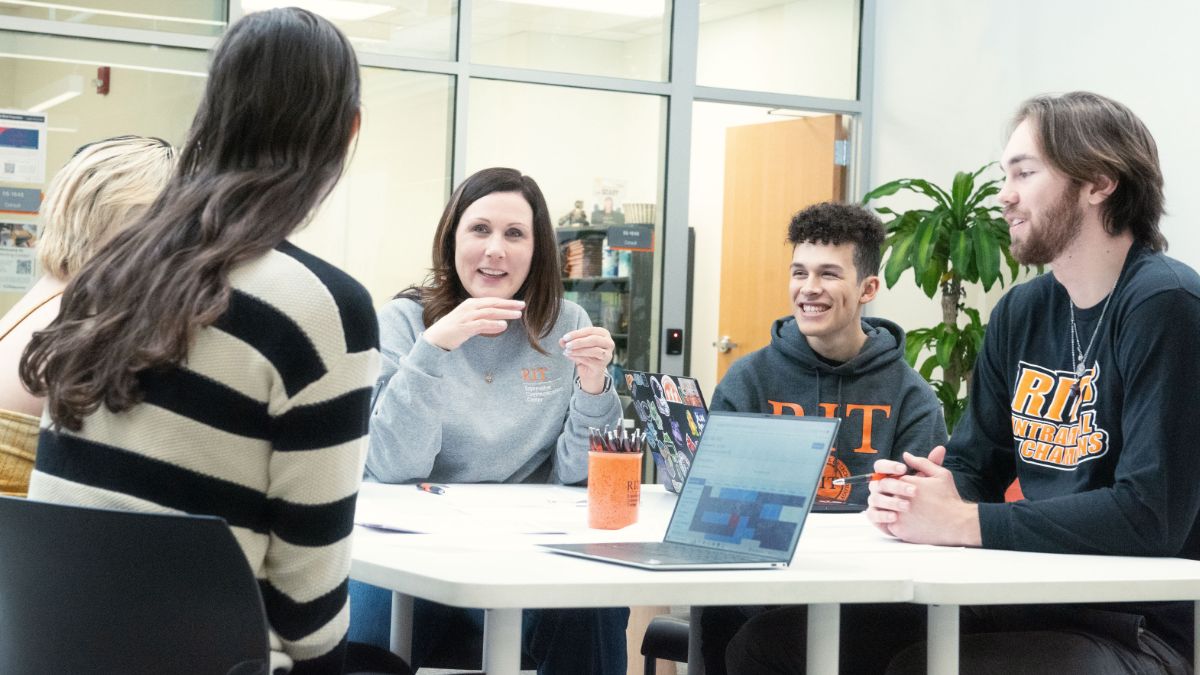Applied Arts and Sciences Associate in Applied Science Degree

Applied Arts and Sciences
Associate in Applied Science Degree
- RIT /
- School of Individualized Study /
- Academics /
- Applied Arts and Sciences AAS
Customize your education with an AAS program in Applied Arts and Sciences. Tailor your learning journey.
93%
Outcome Rate for Program Graduates
40%
Up to 40% Higher Salary
$52K
Median First-Year Salary of Graduates
14+
Concentrations
Overview for Applied Arts and Sciences AAS
Jobs that require multidisciplinary, hybrid skills sets not traditionally associated with one occupation are growing at twice the rate of the overall job market, are higher paying than their more specialized counterparts, and are immune to the threat of automation.
RIT's online associate of science in applied arts and sciences is a customizable degree for students who would like to combine different disciplines or topic areas tailored to their career goals and interests. This program is also ideal for students who may have prior college learning or would like to change or expand their areas of expertise. In this program, you will work closely with an advisor to design your plan of study, all tailored around your career aspirations and goals.
While this associate degree is a stand-alone credential valued by employers, the course work may also be applied to RIT’s individualized program bachelor’s degree.
Applied Arts and Sciences Degree: Online or On-Campus
The applied arts and sciences AAS degrees offers you an opportunity to create an individualized undergraduate program of study. The degree requires you to complete at least 60 credit hours of course work comprised of general education courses along with course work in one or two professional concentration area. Each concentration is customized by you, with guidance and advice from your academic adviser, and crafted from courses that provide you with expertise in specific areas of study. Courses may be chosen from throughout RIT's nine colleges and from nearly all of our degree programs. A sampling of concentration areas include:
- Business Studies
- Communication
- Computer Graphics
- Criminal Justice
- Health Systems Administration
- Leadership
- Literature
- Organizational Change and Leadership
- Project Management
- Psychology
- Sociology
- Technical Communications
- Web Design and Development
- Women and Gender Studies
The applied arts and science degree may be completed on campus, online, or by combining on-campus and online course work.
Curriculum for 2025-2026 for Applied Arts and Sciences AAS
Current Students: See Curriculum Requirements
Note for online students
The frequency of required and elective course offerings in the online program will vary, semester by semester, and will not always match the information presented here. Online students are advised to seek guidance from the listed program contact when developing their individual program course schedule.
Admissions and Financial Aid
First-Year Admissions
This degree offers students the opportunity to create individualized undergraduate programs of technical and professional study. Applicants should speak directly to a first-year admissions counselor in the Office of Undergraduate Admissions for more information.
Transfer Admissions
This program offers students the opportunity to create individualized undergraduate programs of technical and professional study through its applied arts and science program. The applied arts and science program is particularly appropriate for individuals who have prior college-level learning, are interested in changing majors, have unique ideas about how they want to design their academic areas of study, or want to prepare themselves for a career that requires skills and expertise from several disciplines. Applicants should speak directly to a transfer admissions counselor in the Office of Undergraduate Admissions for more information.
Financial Aid and Scholarships
100% of all incoming first-year and transfer students receive aid.
RIT’s personalized and comprehensive financial aid program includes scholarships, grants, loans, and campus employment programs. When all these are put to work, your actual cost may be much lower than the published estimated cost of attendance.
Learn more about financial aid and scholarships
Additional Information
Online Study Restrictions for Some International Students
Certain countries are subject to comprehensive embargoes under US Export Controls, which prohibit virtually ALL exports, imports, and other transactions without a license or other US Government authorization. Learners from the Crimea region of the Ukraine, Cuba, Iran, North Korea, and Syria may not register for RIT online courses. Nor may individuals on the United States Treasury Department’s list of Specially Designated Nationals or the United States Commerce Department’s table of Deny Orders. By registering for RIT online courses, you represent and warrant that you are not located in, under the control of, or a national or resident of any such country or on any such list.
Accreditation
Contact
School of Individualized Study
585‑475‑2234, sois@rit.edu

